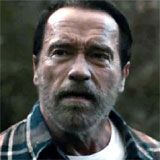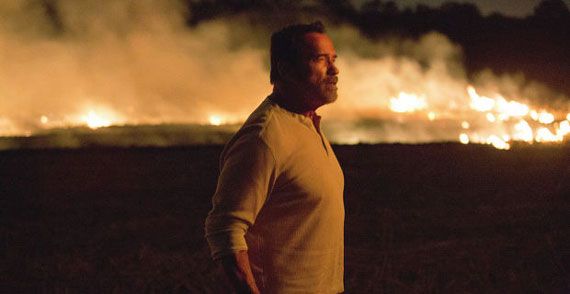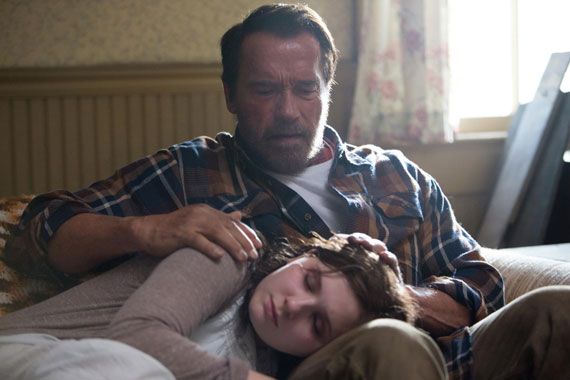What would it be like to be an arm's length from the apocalypse? That's the dark question looming at the center of "Maggie," Henry Hobson's directorial debut.
Arnold Schwarzenegger and Abigail Breslin star as a father and daughter forced to face the fallout from a zombie epidemic when it hits home. When runaway Maggie (Breslin) is bitten, Wade (Schwarzenegger) must protect his daughter from authorities, even as the two confront their past and the inevitable choices that lie ahead.
SPINOFF sat down with Hobson at the Tribeca Film Festival to discuss his unusual interpretation of the zombie narrative, and how this quiet indie drama came to star one of Hollywood's biggest action heroes.
Spinoff: This is an unusual take on the zombie genre. Do you consider "Maggie" a horror movie?
Henry Hobson: No. I mean it's probably closer to something like "Days of Heaven" than it is "28 Days Later." There's a degree to which [it's more like] "Ordinary People." It's much more about the drama, so that's what makes it more unusual. I think we're starting to see -- whether it's with television, like "The Walking Dead," "In the Flesh," "The Returned," or even comedically with "Life After Beth" and "The Last of Us," we're seeing more of an audience acceptance of "Yeah, use the zombie thing but tell me a story that's about a family. Or tell me a story that I can see parts of myself in, parts of my own life in."
Because "Maggie" isn't exactly post-apocalyptic. It's more like the beginning of the end of times.
Exactly. Well, in a way the post-apocalypse is not near [Maggie's family], but you know that it's happened somewhere. And so I like to think that it's the first time you're not seeing the meteor flying through and exploding and hordes of things coming out. You're just seeing what'd it be like to be an arm's length from the apocalypse.
Do you consider yourself a horror fan?
I am a horror fan, as much as I can take. I do scare easily, but I think that it also allows me to hopefully understand how to get a little bit of fear out [into my film].
Review: Schwarzenegger's "Maggie" Isn't the Zombie Movie You Expect
Speaking to "Maggie"s zombie genre expectations, no one actually says "zombie" in the film. Can you tell me about that decision?
It was a really tough one, because we wanted to make it as real as possible. And it does feel like you're looking at someone who's dying of a terrible illness. And what would the kind of Ebola-version of zombie-ism be like? There would be no name [for people afflicted]. And we don't know why it's happening, why it's happening to the crops, to everything natural. So there's a degree to which to use the zombie name would make it feel like we were putting words in your own mouth.
What we wanted to do was say "This is like the real version." Which is a high and mighty thing to say, but the aim was to kind of say, "If this was to happen tomorrow. It would probably take eight or nine weeks for you to kind of transition like a normal illness." They probably wouldn't have a real name for it. Maybe a couple of news channels, Fox News would come up with huge graphics saying "Zombie Outbreak." But by and large you wouldn't want to evoke that hysteria or panic. Or even amongst ourselves, you wouldn't want to say, "Oh, you're one of the zombies, are you?" Because it evokes fear.
How did Arnold come to be involved in the project?
We spent a bit of time trying to cast that perfect actor. The way Wade was set up was a pillar of the community, his strength, his forcefulness. I saw him as the person everyone would go to in the town [in times of peril]. So what I wanted to do was not have a scene setting up like some guy in a bar fight to show he's strong. Some guy who people come to to be like, "Can you solve my problems?" I wanted to have an actor who could do that just in one frame without even having to say anything. And when you talk about people like Clint Eastwood or now Arnold Schwarzenegger, you're able to say, "Here's a guy who is as strong as you can get, physically, emotionally, in every way." And so what would he be like if you took that away? I use the shorthand of his strength to then show a vulnerability. So for me Arnold was a choice that allowed for really interesting different take by using his strengths against him.
It's an interesting casting choice because no matter how physically strong he is, he can't stop what's happening to his daughter, Maggie.
Exactly. Exactly. And if you think of other actors, there aren't many other actors around that you can immediately go to that, that immediately strengthens that concept. And so I think Arnold provided that shorthand. And when he was put forward, it was like, 'This this could be really interesting."
I was surprised when I initially heard about this film, because Arnold's not known for doing small movies. He's not known for doing straight dramas. Were you at all surprised when he signed on?
Amazingly surprised. Of course, yeah. I mean, we're talking about a guy who we're all fans of. I mean, it's bizarre. Talk to anybody, "Yes! I love 'Terminator.' Yes, I love 'Predator.'" Everyone's a fan of his work, from horror to action to comedy. And I think on that point he's always shown that he wants to change, and he'll tackle anything, including running for governor in that economy, which was the most bizarre thing to do! But yes, it was truly shocking to have that moment of: Arnold wants to be involved. Fantastic!
And what was your path to "Maggie," because this is your first feature, which is kind of insane.
I take a similar path to quite a few commercial directors and designers. I mean, if you go back, Ridley Scott was a graphic designer, so the graphic design path -- Hitchcock was a graphic designer--
Because you've done a bunch of title sequences for features.
Yeah, so that's my background, my way back background was graphic design. So title sequences, the Oscars [ceremony broadcast], and bits like that. Then commercially I moved into ads for video games, lots of video game commercials. The really great thing about that is that you're allowed to use some really amazing assets and creatures, terrifying robots or whatever. And then you're able to use that with live-action, the human side of it. So a lot of the commercials I've done have done that, like here are people. You're not quite sure where they're going. You're not quite sure what they're doing. You're not sure what's going to happen to them, and slowly you release the secret of what it's about and what they're about to encounter. And so those projects are quite clearly like short films. So I follow in the path of other commercial directors.
And that actually seems like a really natural transition to "Maggie," where you have these other worldly elements like zombies but treating them in a way that's--
Yeah, they're not front and center. We see like four or five zombies in the whole film. And they're in the background or -- we don't get this kind of front and center, aside from Maggie. And we don't get [zombies] coming at you from every different angle, which I think is nerve-racking and terrifying to kind of think we're making a film that plays to the genre but has no genre. Which is the most bizarre [part].
"Maggie" mentions 14 rules of how to behave around the infected, but only a couple are shared. Do you remember what the others on the pamphlet were?
No. Um, no.
I was kind of hoping those pamphlets would be handed out today.
Oh, that would have been great! Yeah, we have them. The only problem would be that the pamphlets -- the production designer, she made terrible spelling mistakes all the way through it. So we were like trying to reframe, "Well, that's spelled wrong. OK, that's spelled wrong." So that was great.
But yeah, we also had on all the doorways of the hospitals, we had a code, like hobo markings like in chalk outside each room. And there's a great wall -- I wish I had it -- a great wall chart of all the different stages of the infected. There were 24 and then we had one at the end, which was Zed-STD, the zombie sexually transmitted disease.
Oh, God!
Our little joke thing that we put in at the end.
But how it's passed from person to person is a little ambiguous in the film. It's suggested that it's similar to HIV or Ebola, where it's through bodily fluid transmission. But that's not really the focus of the film.
No, not at all. And I think the fact that we don't say how or where she was bitten, we imply that it was something traumatic. And so she doesn't want to talk about it. And people around her don't want to talk about it. I think that's incredibly formative.
Right, because the film starts with Maggie having run away from home, and it's unclear in the film if she ran away because she got bit or ran away and then got bit.
Yeah, I think we want to suggest that she is the more adult one in the family. The fact that she was bitten, and then ran away. They know she was bitten. She was bitten at home. Wade wasn't able to protect the family. She was bitten. She runs away to protect the family. So suddenly, she's more of the kind of powerful figure. And more adult than he is.
Because he's, "What do I do? Shit. I wasn't able to protect my own family." He's managed to get through the whole apocalypse fine, and then she goes and gets bitten after everything's kind of simmering down, or trying to rebuild itself. And I think there's something ultra heartbreaking about that. And the fact that Wade doesn't know what to do. He just drives, goes to get her. Brings her back. What's the plan now? I have no plan. I have no idea what I'm going to do.
The film takes on some surprising turns. It starts off, and I thought it was a father-daughter movie, but ultimately, it is a movie about Maggie and effectively about her growing up, in a very bleak way.
I think "bleak" is the operative word. I think the fact that you've got a teenage story, you've got a terminal illness story -- you know we see "The Fault in Our Stars," and the one with Chloe Moretz ["If I Stay"], you've seen those kind of films. But to twist it with the zombie lens felt like an interesting way of allowing teenagers to look at the film and say, "Oh, I can see parts of myself in that. I'm going through shitty struggles but at least I'm not a zombie."
Fair point. So "Maggie" was actually supposed to premiere at Toronto International Film Festival last fall, but then Lionsgate bought it and pulled it. Can you tell us about the thought behind that move?
Well, I was upset. But the thinking was with Lionsgate, they wanted to push the VFX a little bit more. It was going to be a tough one. It was going to be tough to get it all finished for that. There was a thinking of we want to get all the VFX in, sit with it. Color it. Make sure it's all right. And so there was a bit of me that was like, "OK, sure." I don't have to rush for four weeks. But I was also kind of keen to get it out.
So I think the decision was that it was still a little rough around the edges, from the visual effects perspective. And hopefully they are relatively invisible in the film. But there was hundreds of visual-effects shots in the film. So the work did work.
Are you getting offers now from studios for bigger projects?
There's been a couple of interesting things, but, yeah, we'll see what pans out in those.
Is there anything you're really hoping to get on board with? Like a franchise you have your eye on or a genre you want to jump into?
Sci-fi I've always been a massive fan of, and I've been working for a while on a project. But I think J.J. Abrams killed the project with his TV show by doing a very similar, "The Caveas of Steel" Isaac Asimov. Which I'm a big fan of the sci-fi world, and I think the idea of telling that kind of human-robotic emerging story is fascinating. To a recent project, "Ex Machina" blew me away.
So good right!
So fucking good. I saw it SXSW, and was just like, "You fucking bastard, that's so incredibly brilliant." Even the shitty keycards he uses!
For my last question, the sound design in your movie is really sharp and interesting. There's a heartbeat that kind of goes throughout. And the scene where Maggie cuts herself has an intense sound design. Can you tell us how that evolved?
In a lot of my commercials I use sound design front and center. And I think sometimes I had big fights with the sound designer. Like "No, take that away. Take that away. We're going to put this in." But he'd argue that's not real to the scene, and I was like, "That doesn't matter, we're inside her head. Or we're feeling that space. We might be looking at her on the other side of the room but I want to feel like I'm inside her head." Because then that puts me looking down at her finger. So sound for me is integral to that journey. And so when you're seeing someone turning, she's maybe a bit more sensitive to the crackling noise or she can feel that heartbeat kicking, or the rhythm of something unnatural in the room. And there's a generator always going. In every space, there's this constant hum.
And that was the most enormous fight because that hum--it made no sense to have a big, unnatural sound in every room. But I was like, "No, I want that constant reminder that they're having to run things off of generator power. I want the wind. I want the kind of emptiness of no bird life." The only thing that we couldn't get rid of shooting in New Orleans was the fucking cicadas. Whatever was chirping like four foot away from us at all times.
But the rest of it was about stripping out the nature so that you get that kind of Hitchcockian thing, where you're like, "What? The birds have stopped making the sound. What's just happened? Something's about to go down?" And to have that almost constant, you get to maybe half-way through the film, you get to maybe the end and you go, "Wait. There's no birds. And that's a little unnatural." So, I definitely love sound design and I love being able to kind of play with that, especially with such a tiny film, with such a small story. It was important for me to try to hammer some tension into the smaller areas.
"Maggie" opens Friday in select theaters and on demand.



